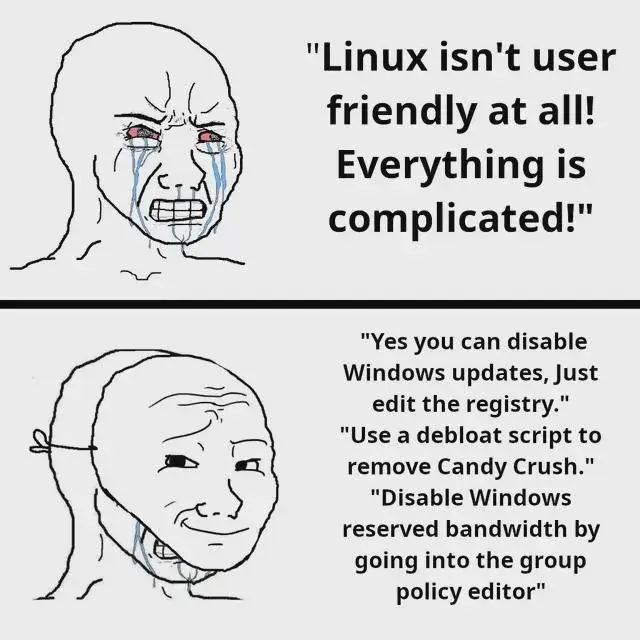this post was submitted on 07 Mar 2024
1414 points (93.0% liked)
linuxmemes
20880 readers
10 users here now
I use Arch btw
Sister communities:
- LemmyMemes: Memes
- LemmyShitpost: Anything and everything goes.
- RISA: Star Trek memes and shitposts
Community rules
- Follow the site-wide rules and code of conduct
- Be civil
- Post Linux-related content
- No recent reposts
Please report posts and comments that break these rules!
founded 1 year ago
MODERATORS
you are viewing a single comment's thread
view the rest of the comments
view the rest of the comments

Shit happens 🤷. It happens to milti-billion dollar companies as well, like MS. In fact, it happens a lot more frequently (and it's more destructive) than it does with Linux or any other POSIX based OS. I have yet to see an update deleting all my personal files in
/home.Troubleshooting problems is about the same IMO, if you're familiar with the OS and how things work (in general). You just use the terminal more in Linux, since you'd have to open the file manager as root in order to troubleshoot, and that brings a whole other set of issues, like file permissions if you happen to copy a file to, let's say
/home/<username>/Desktoptemporarily, for troubleshooting. Ah, but now the file has root permissions, not the permissions your user has, and root is the owner of the file, so basically, your user only has read permissions, that's it. You can't move or delete the file. In order to move it or delete it, with a GUI, you'd have to open up the file manager as root again and do it from there. And that is why using the terminal to accomplish these things is so much simpler. You just addsudoin front and that's it, the command will do whatever root could do. And then you realize that just copying and renaming the file tofilename.bakin the same location where the file originally resides is so much quicker and better. You can delete or move the file just by addingsudoin front of the command, no file manager needed.So yeah, troubleshooting is more or less the same IMO.